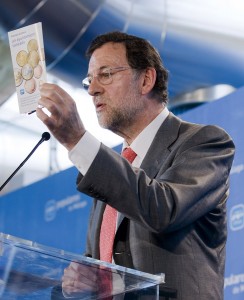
As rumours that next year’s general election will be brought forward to the autumn intensify, so does the realisation that by the end of the year, Mariano Rajoy could be prime minister. The strange thing is, judging by his party’s recent behaviour, this doesn’t seem to have dawned on him.
If he had fully grasped the reality of his situation, you would think he would tone down the talk of Spain being an economic basket case. But his opposition Popular Party (PP) is determined to hint, suggest, or just plain decry, that the country is in real trouble.
Since last year, the PP has been openly wondering whether Spain deserves to be in the same bracket as Greece, Portugal and Ireland. In November, as Spain sought to fend off market jitters, party spokesman Esteban González Pons said:
“There were speculative attacks on Greece, but Greece had lied; there have been speculative attacks on Ireland and it looks like Ireland is going to have to say a different truth to that which it made public; we would like what this Spanish government says to be the truth.”
Meanwhile, party number two, María Dolores de Cospedal, has been declaring the region of Castilla-La Mancha “bankrupt” for months. We still don’t know if this is true, but now that she has been voted president of the region, she can verify her allegation.
This scaremongering made sense from a purely electoral point of view – the same way that insisting the government is plotting with ETA perhaps makes electoral, if not common, sense. The PP has opened up a double-digit lead on the governing Socialists in polls by pursuing this line and also ensuring the unloved Rajoy rarely speaks out. At his first meeting with the press from the PP’s headquarters in Madrid in five months, Rajoy recently said: “I’ll give press conferences when I have something important to say.” Such an admission makes him an easy target of jokes, but his head-down mentality has worked.
Or at least so far it has. His refusal to offer a detailed economic plan while allowing Zapatero to fall further and further in the polls is based in great part on the example of Britain’s David Cameron, whose frank admission of planned cuts hurt him during the 2010 general election campaign.
But Rajoy now has a responsibility that goes beyond merely winning the next election, something he will now surely do. Spain’s financial credibility is still hanging in the balance and its collapse would be disastrous for the whole of Europe. Expecting his party to stand firmly behind the Socialists on their bold and unpopular austerity campaign, or offering a detailed plan of his own, may be asking too much. But muting the PP’s more apocalyptic voices, rather than playing chicken with Spain’s economic stability, surely isn’t.
Leave a Reply
You must be logged in to post a comment.